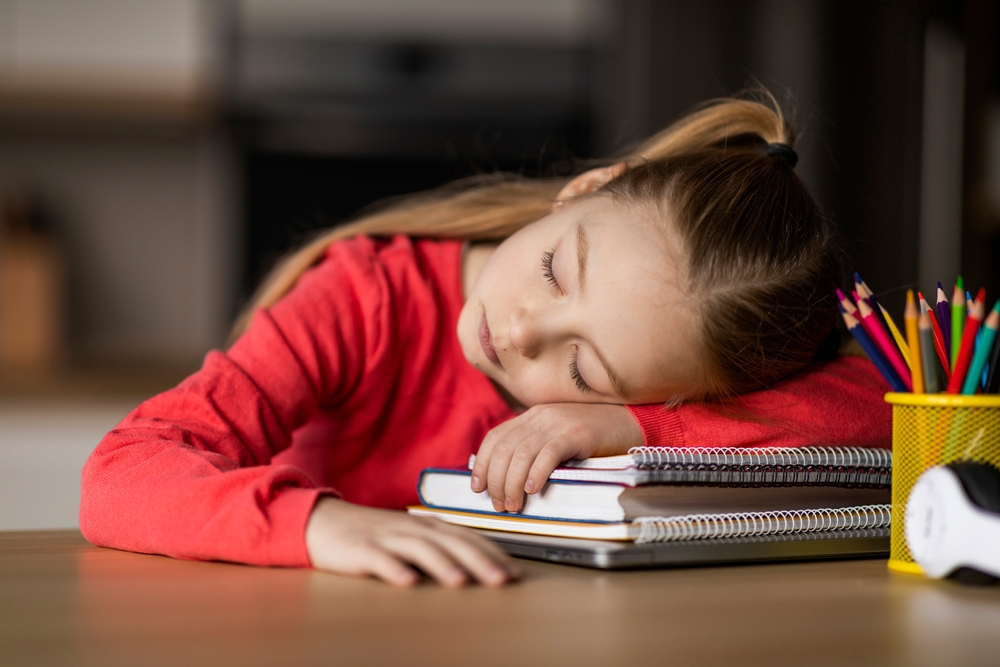Understanding how poor sleep quality affects school performance is key for parents, and knowing what you can do to improve sleep is something that many guardians struggle with. School performance is reduced when students suffer from poor sleep as cognitive abilities decline, leading to trouble with concentration, issues with memory retention, and worse emotional regulation.
Not only that, but not getting enough sleep can significantly worsen symptoms in those with ADHD, depression, and more, which will further worsen school performance and overall well-being. No matter the student, school performance and sleep are closely tied, and a lack of sleep in students can lead to negative outcomes in more ways than one—and knowing what you can do to combat it is key.
Why Does Sleep Matter So Much for Children and Students?

Getting enough sleep helps students be able to consolidate memories, improve problem-solving and focus, and is crucial for helping with emotional regulation. However, sleeping enough is also key for the physical well-being of students (and anyone else), as it is required in order for the body to heal and repair itself. Overall, sleep is one of the most important things to focus on and make time for, as it has a strong impact on cognitive abilities as well as physical condition.
Once you fully understand how poor sleep quality affects school performance, you will quickly realise that many problems that your kids (or, even you) have faced could be related to poor sleep. Once you understand what the problem is, you can take steps to rectify it.
How Does Poor Sleep Quality Impact Concentration and Focus?
Many studies over the years have looked into how poor sleep quality affects school performance, focus, and general cognitive abilities. The effects of poor sleep on concentration come down to your brain starting to work against itself when there is an imbalanced inhibition in different parts of the brain that are related to tasks. The primary part of the brain responsible for concentration and focus are the prefrontal areas, and when you don’t get the sleep you need, this part of the brain is no longer able to effectively coordinate—making concentrating almost impossible.
Learning is heavily impacted by a lack of sleep, as not getting enough sleep can diminish problem-solving skills, reduce concentration and attention, and more, all impact academic performance. When we don’t sleep enough, memories and information cannot properly be consolidated, and issues like forgetfulness, lack of concentration, and more all become more severe, making learning more difficult.
What Is the Link Between Sleep and Memory Retention?
Sleep plays a critical role in memory retention and memory in general via memory consolidation. This effectively strengthens and stabilises new memories in the brain, making them available for recall when needed. According to the Sleep Foundation, failing to get adequate sleep can inhibit learning by as much as 40% due to the body not going through the necessary sleep stages that prepare the brain for learning new information.
What Are the Emotional and Behavioural Effects of Sleep Deprivation in School?
One fascinating way how poor sleep quality affects school performance is emotional and behavioural, with children who experience sleep deprivation having their ability to regulate emotions significantly reduced. Sleep deprivation impacts concentration, but can also lead to increased anxiety, depression, mood swings, and irritability, which can all impact school, exams, and daily life. Students are also more likely to make poor decisions and be more impulsive, possibly leading to misconduct both at home and in school.
How Much Sleep Do Children and Teens Really Need?

The amount of sleep that children need depends on age, with those between the ages of six and 12 benefitting from up to 12 hours of sleep, and 13–18-year-olds benefitting from up to 10 hours of sleep. There will be individual differences to take into consideration, but aim for younger children to get between nine and 12 hours, and 13–18-year-olds anywhere between eight and 10 hours. Child brain development sleep times are important for proper development and regulation, and is not something that should be overlooked by parents and guardians.
This is now much sleep different groups of people should be getting:
- Infant (four to 12 months) – 12–16 hours
- Toddler (one to two years) – 11–14 hours
- Young children (three to five years) 10–13 hours
- Children (six to 12 years) – nine to 12 hours
- Teenagers (13–18 years) – eight to 10 hours
- Adults (18+) – seven or more hours
Practical Tips to Improve Sleep Quality for Better School Performance

Now that you know how poor sleep quality affects school performance, what can you do to get better sleep? We will go through some tactical tips, including what to do if you can’t get to sleep, building a good sleep hygiene routine, making necessary changes to improve your comfort, putting the phone away, and relaxing before bedtime.
If You Can’t Get to Sleep, Do Something Else
There’s no point in lying in bed, staring at the ceiling for hours. If you can’t get to sleep within 15–30 minutes, get up and go do something for a few minutes and try again. This could be building a puzzle, reading a book, or anything else that is not going to stimulate you.
Have a Good Sleep Hygiene Routine
Having a good sleep hygiene schedule can go a long way for helping you get good quality sleep (and more of it!). You will need to find what works for you, but there are a few rules that we recommend to everyone who wants to have good sleep hygiene.
You could implement the following into a sleep routine:
- Go to bed at the same time every day
- Avoid caffeine and alcohol in the evenings and night
- Keep meals smaller before bedtime
- Avoid heavy exercise within a few hours of going to bed
- Follow the same routine before going to bed
- Do something that helps you to calm down and get ready to sleep
Make Necessary Changes to Increase Comfort
Sleep is easier when you are comfortable, so make changes you need to get in that zone and be comfortable. This could be getting different sheets or blankets, getting the room to be the perfect temperature, controlling light pollution, and more. We all have sensitivities, likes, and dislikes, and the longer we try to ignore them, the longer they will impact our ability to get a good night’s rest.
Put the Phone Away Timeously
Putting your phone (or, any technology) away at least 30 minutes before going to bed is recommended to help reduce stimulation and blue light. Some people may find it more beneficial to stay away from the phone up to two hours before bed, so you may need to try out different times to see what works. It’s also important to be in the right mindset for bed, and avoid doomscrolling or looking at negative news, especially if you or your children struggle to switch off.
Find Things That Help You Relax
Everyone will have different things that help them relax. Whether it’s reading a look or building a puzzle, find what world for you to help you wind down and get ready for sleep. Ensure that you do activities that are not stimulating so that you can get in the right headspace. Avoid social media, screen time or taking part in passive habits to relax!
How The Brain Workshop Supports Children’s Cognitive Health

Overall, the cognitive impact of poor sleep cannot be overstated, and understanding how poor sleep quality affects school performance is critical for parents who want their children to thrive in school. Sleep and learning in children go hand-in-hand, and student sleep deprivation will only harm your child moving forward.
Worried poor sleep is affecting your child’s learning? Contact The Brain Workshop child focus services for expert guidance on supporting brain health and academic success. Learn more about us at The Brain Workshop, meet our team, check our events, or even read our FAQ.






